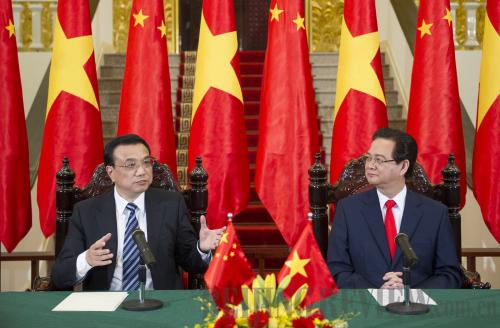|
 |
|
BROTHERHOOD: Chinese Premier Li Keqiang (left) holds a joint press conference with his Vietnamese counterpart, Nguyen Tan Dung, on October 13 in Hanoi during the last leg of his Southeast Asia visit (HUANG JINGWEN) |
The autumn of 2013 is a busy season for China's diplomacy. The successive visits of President Xi Jinping and Premier Li Keqiang to Central Asian countries and Southeast Asian nations as well as their presence at the Shanghai Cooperation Organization (SCO), APEC and East Asian summits have demonstrated the top priority that the new generation of Chinese leadership has given to Asia.
It is believed that the new Chinese Government has slightly readjusted its foreign policy. While continuing to attach great importance to relations with major powers, China will further balance its diplomatic strategy by enhancing relations with neighboring countries.
SCO countries—the countries of Central Asia and Russia—and ASEAN members, like the two wings of a dragon, are twin priorities for China's neighboring diplomacy. During their visits, President Xi proposed that China and Central Asian countries join hands to build a Silk Road economic belt to boost cooperation, while Premier Li proposed a new Maritime Silk Road of the 21st century with ASEAN countries.
During their forays overseas, both leaders have repeatedly stressed China's principles of non-interference in the internal affairs of countries and attempted to reduce misgivings of neighboring countries toward China's rapid development, as well as desalinate geopolitical competitive factors between China and other major powers.
An unavoidable problem for China when conducting its neighboring diplomacy is how to deal with interests in the Asia-Pacific region regarding the United States, the world's sole super power, and how to turn competition into cooperation. Some Chinese and overseas scholars say that the Chinese Government is responding positively to the "Going West" strategy put forward in academia. That strategy states that if China puts excessive diplomatic resources into East Asia, China is bound to engage in conflict with the United States. Therefore, China should pay more attention to its western neighbors in Central Asia for a more balanced diplomacy.
Although Beijing has repeatedly reiterated that its active neighboring diplomacy is not intended to squeeze the United States out of Asia, and Washington has repeatedly stressed that it welcomes China to play a bigger role in the world and has no intention to contain its in Asia, international public opinion prefers a "zero-sum" game between the two, a kind of geostrategic competition.
The competition between China and the United States in Asia has been exaggerated. Both need the peace, stability and prosperity in Asia. Top leaders of the two countries have reached consensus on building a new type of relationship between major powers, and the Asia-Pacific region was made the prime arena for the two to practice this. Neither China nor the United States is willing to fall victim to a rat race between an emerging power and an established power. And both have recognized that a peaceful coexistence in Asia is a prerequisite for the two sides to achieve diplomatic goals.
The Obama administration has been ambitious in its "returning to Asia" strategy during his first term, trying to safeguard the United States while rebalancing the rising influence of China in the region. However, Obama has to accept the reality that China will play a more direct and critical role in Asian issues than the United States in the days ahead.
Forging ahead
As both a land and sea power, China has incomparable advantages in Asia due to its unique geopolitical and cultural influence as well as its growing direct investment in the region. The only card that Washington could play to counter Beijing would be its traditional military presence, using it to interfere with the territorial and maritime disputes between China and some neighboring countries to slow the pace of regional countries' drawing nearer to China.
| 